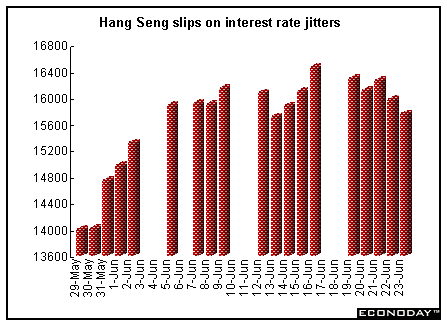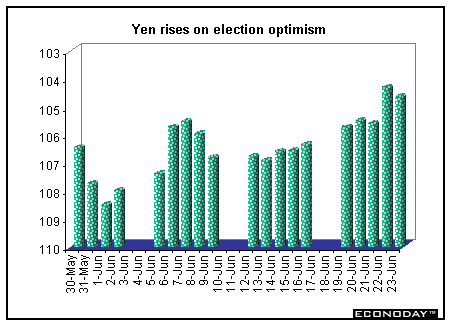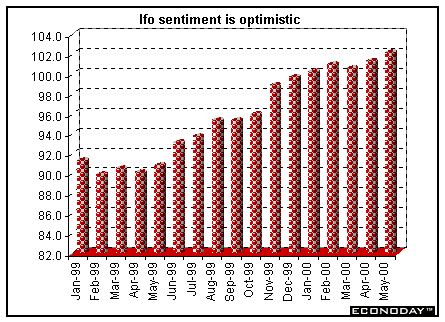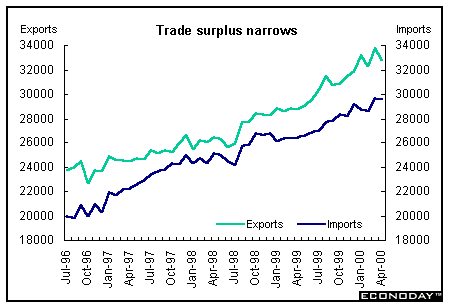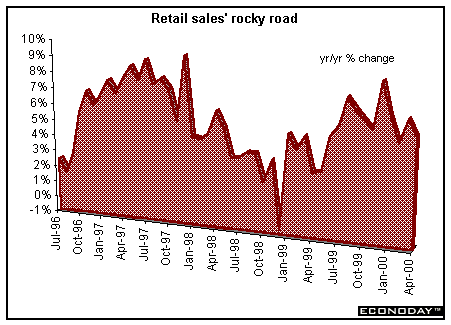| Previous Articles |
|
Summer
sets in
Britain
and Europe
In London, the market's sluggish behavior reflected a general lack of enthusiasm resulting from the distraction of the Royal Ascot racing season and gloom over England's loss in the European football championship. The London FTSE 100 declined four out of five trading sessions, as the previous week's more encouraging outlook for interest rates gave way to a much more cautious view. With the end of the second quarter looming Friday and the summer sporting events season getting into full swing (Wimbledon and the British Open), investors were happy sitting on the sidelines rather than being involved in any market action that did occur. There was virtually no economic news to attract attention as well. The Bank of England monetary policy committee minutes of the June 6 and 7 meeting surprised the market. Rather than the expected 9-0 vote in favor of unchanged rates, the result was 6-3, with the dissenting trio backing a 25 basis point rate increase. This dented the growing consensus that British interest rates might have peaked at 6 per cent. On the week, the FTSE 100 closed down 134.5 points or 2.06 percent at 6391.5. Both the Paris CAC and Frankfurt DAX suffered from investor weariness also. However, the CAC ended the week at 6545.35, up 89.09 points or 1.38 percent while the Frankfurt DAX sank below 7,000 to end the week at 6980.41, down 150.99 points or 2.12 percent. Asia
The yen rose to a two month high against the dollar following a remark by a Bank of Japan official suggesting the central bank will raise interest rates soon. Many analysts are concerned the economy's nascent recovery isn't strong enough to withstand a possible interest rate increase. And investors are concerned that the strong yen will hurt the exporters' overseas profits when they are repatriated. At week's end, the Nikkei 225 stood at 16,963.21, up 644.9 points or 3.95 percent on the week. Hong Kong markets were riddled by interest rate worries and a slump in U.S. technology stocks fueled selling in similar local shares. Hong Kong's Hang Seng index shed 696.3 points or 4.24 percent to close at 15,738.08. The Hang Seng faltered as interest rate fears resurfaced. Some investors were concerned that the Fed may raise interest rates now that the Organization of Petroleum Exporting Countries (OPEC) raised crude oil output by less than expected. This would increase the chance that oil prices would remain high and spark U.S. inflation. Many investors stayed on the sidelines ahead of the Fed's meeting.
Currencies
Several factors are behind the yen's recent appreciation including the Japanese equity markets' recovery, constant hints from the Bank of Japan that they are on the verge of ending their zero interest rate policy, and expectations that the national elections would preserve the status quo.
The yen hovered near a two month high against the dollar on investors' expectations that Japan's coalition parties will win a majority in elections Sunday, leaving government spending policies in place to boost the economy. The yen was also bolstered by remarks by a Bank of Japan Deputy Governor who reportedly hinted the bank was considering ending its zero interest rate policy (ZIRP), but admitted that more information about the economy's performance was still necessary. This statement would seem to preclude an increase at their June 28 meeting. The proximity of the July 17 policy meeting to the G-7 meeting on July 8 is a strong argument against expecting a Bank of Japan rate move anytime soon. Traders were generally sidelined ahead of the June 25 Japanese election and release of the quarterly Tankan business sentiment report on July 4. Japanese officials continued to try to talk the yen lower as concerns heightened that the Ministry of Finance would intervene to support the dollar. The chorus of those bemoaning the yen's strength said that it did not reflect prevailing economic fundamentals. Indicator
Scoreboard
Germany - The May Ifo Institute's west German business sentiment index rose to 102.1 - its highest level since March 1991. Both the current conditions and business expectations indexes increased. The May east German business sentiment was down to 107.6 from 109.0 in April. The current conditions index increase but business expectations fell sharply.
France - April seasonally and workday adjusted manufacturing output fell 0.2 percent but was up 5.3 percent when compared with last year. All manufacturing sectors fell except for capital goods, which rose 0.6 percent. Declines were led by the auto industry, which dropped 1.6 percent in April but was up 10.7 percent on the year. Consumer goods output was down 0.7 percent on the month but 2.3 percent higher on the year. Italy - First quarter gross domestic product rose 1.0 percent from the previous quarter and 3.0 percent when compared with last year. Private consumption, which rose 0.7 percent on the quarter, accounted for 70 percent of the overall increase. Exports rose 3.6 percent on the quarter, while imports increased 1.2 percent and investments rose 1.2 percent. May merchandise trade deficit with the European Union fell to L443 billion, compared with a L2.347 trillion surplus in May 1999. Non-EU imports were up 61.9 percent when compared with last year, the strongest increase in at least four years, while exports rose by 32.9 percent. The April world trade deficit was L623 billion, with imports rising 14.8 and exports up 8.9 percent when compared with last year. Spain - April workday adjusted industrial production rose 4.9 percent when compared with last year. Strong gains were recorded in the basic goods sector, up 7.8 percent on the year, and in the capital goods sector, up 3.3 percent on the year. April unadjusted industrial output rose 0.1 percent on the year because of two less working days in April this year when compared with a year earlier. First quarter seasonally and trend adjusted gross national product rose 1.0 percent on the quarter and 4.1 percent on the year. Excluding the trend adjustment (which smoothes quarterly changes) first quarter GNP rose 2.0 percent on the quarter and 8.1 percent on the year. Private consumption climbed a real trend adjusted 1.1 percent on the quarter and 4.5 percent on the year. Gross fixed capital formation was up 2.1 percent on the quarter and 6.3 percent on the year. Britain - June Confederation of British Industry industrial trends survey showed that the total orders balance fell to -18 percent from -10 percent in the previous month. But this was still higher than the -25 percent recorded in June last year. Export orders worsened with the balance dropping to -39 percent from -35 percent in May. The CBI reported that demand from overseas is now further below normal than at any time over the past year. Output expectations remained negative in June with the balance at -7 percent from -6 percent in May. Before May, expectations had been positive for nine months in a row. May merchandise trade deficit with countries outside the European Union narrowed to Stg1.792 billion May from Stg2.284 billion in the previous month. The value of exports to non-EU countries rose 6.5 percent on the month while imports fell 0.9 percent. Stg250 million of the improvement was due to oil and about Stg200 million was due to aircraft. The deficit excluding oil and erratics narrowed to Stg1.5 billion from Stg1.7 billion in April. April global merchandise goods deficit widened to Stg2.520 billion when compared with Stg1.938 billion in the previous month. Americas
April retail sales dropped 1.2 percent primarily because of lower automotive and seasonal product sales. April's decline cancelled almost half the 2.2 percent gain posted in March. Retail sales were down 0.5 percent at constant prices. Cool weather in April may have dampened sales of spring and summer clothing as well as other seasonal products. When compared with last year, April sales were up 5.7 percent.
Asia Japan - May's merchandise trade surplus contracted by 29 percent from a year earlier, suggesting that Japan's recovering economy is importing goods at a faster rate than it is exporting. The trade surplus with the United States narrowed 9.8 percent from a year earlier. A 55.6 percent rise in crude oil and a 106.6 percent increase in refined oil product imports on a value basis contributed to the swell in imports, as did a 29.1 percent rise in office machinery imports. Semiconductor, electrical machinery part and metal processing machinery shipments led exports. The surplus with Asian nations, jumped 23.4 percent on the year while the surplus with the European Union shrank 14.4 percent as the weak euro encouraged increased imports from the region. BOTTOM LINE Japan will continue to be in investors' spotlights. With the election over and the ruling coalition reelected, attention will shift to the viability of economic growth. There should be some light shed on the subject by the second quarter Tankan business sentiment surveys that will be released on July 4th.
|
|||||||||||||||||||||||||||||||||||||||||||||||||||||||||||||||||||||||||||||||||||||||||||||||||||||||||||||||||||||||||||||||||||||||||||||||||||||||||||||||||||||||||||||||||||||||||||||||||||||||||||||||||||||||||||


